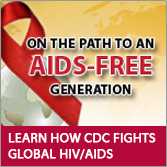Central Asia Regional Office

Strategic Focus
CDC’s Central Asia Regional (CAR) office works to strengthen public health systems in the region by focusing on strategic information, blood safety, injection safety, laboratory services, HIV/AIDS prevention for at-risk and vulnerable populations, and treatment and care services. CDC’s support includes:
HIV/AIDS Prevention for At-risk and Vulnerable Populations
- Building the capacity of prevention specialists through training and on-the-job mentoring
- Implementing evidence-based pilot programs to illustrate and test prevention programs
- Adopting new modes of service delivery
- Expanding prevention and related services for at-risk populations
Treatment & Care Services
- Building the capacity of clinicians through training and on-the-job mentoring
- Strengthening HIV and opportunistic infection treatment and care services
- Developing clinical guidelines for screening and managing HIV infection
- Enhancing screening for and diagnosis of HIV infection and co-infection
Strategic Information
CDC provides technical assistance to the MoH and key stakeholders in areas vital to the prevention, control, and monitoring of HIV infection to:
- Build in-country capacity of epidemiologists through training and on-the-job mentoring
- Improve surveillance systems, including sentinel surveillance
- Implement data triangulation, assist in data analysis and decision making
- Implement an electronic surveillance and HIV case management system (EHCMS) for AIDS Centers
- Develop an electronic medication assisted treatment (MAT) register (EMR) for Narcology Centers
- Improve national monitoring and evaluation systems
Strengthening Laboratory and Health Systems
CDC builds the capacity of laboratory and health systems with high-quality laboratory specialists, blood transfusion specialists, and epidemiologists through:
- Training and on-the job-mentoring
- Assisting with the rapid expansion of HIV diagnosis, treatment, and care
- Supporting quality assurance for HIV rapid testing
- Developing national strategic laboratory plans
- Implementing laboratory quality management systems
- Participating in or conducting national external quality assessment and proficiency testing, including those for HIV rapid testing
- Assisting in developing national external quality assessment and proficiency testing (EQA/PT) programs and supporting participation of laboratories in international EQA/PT schemes
- Supporting laboratory accreditation activities
Key Activities and Accomplishments
Injection Safety
- CDC conducted several assessments of HIV integrated bio-behavioral surveillance (IBBS); HIV care and treatment services; and MAT services in Kazakhstan, Kyrgyzstan, and Tajikistan. The findings served as a basis for national action plans to strengthen IBBS, care and treatment services, and MAT services. CDC has initiated enhanced technical assistance to improve quality of care and treatment in 14 AIDS Centers as well as MAT services at 14 sites (Narcology Centers and Family Medicine Centers) and developed detailed guidelines and an online data entry system for IBBS.
- CDC facilitated nationwide implementation of an electronic HIV case monitoring system (EHCMS) in Kazakhstan, Kyrgyzstan and Tajikistan and supported routine data quality assurance and audit activities. CDC also trained staff in EHCMS data analysis and use for EHCMS data reporting.
- CDC supported the opening of four MAT sites in Kyrgyzstan, including two in the penitentiary system where people who inject drugs receive integrated HIV/TB/MAT prevention and treatment services as part of a “One-Stop-Shop” approach (additional services include HIV testing and counseling, needle and syringe program, and psycho-social support).
- CDC supported the launch of two Mobile Trust Points in Kyrgyzstan—the first program in the region with the aim of improving access of difficult to reach people who inject drugs to basic HIV prevention services.
Contact Us:
- Centers for Disease Control and Prevention
1600 Clifton Rd
Atlanta, GA 30333 - 800-CDC-INFO
(800-232-4636)
TTY: (888) 232-6348
24 Hours/Every Day - cdcinfo@cdc.gov
 ShareCompartir
ShareCompartir



